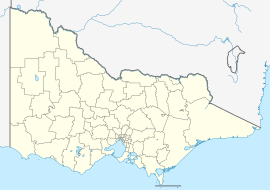McIvor Highway
McIvor Highway | |
|---|---|
| Coordinates | |
| General information | |
| Type | Highway |
| Length | 44.0 km (27 mi)[1] |
| Gazetted | May 1915 (as Main Road)[2] 1959/60 (as State Highway)[3] |
| Route number(s) | |
| Former route number | |
| Major junctions | |
| West end | Bendigo, Victoria |
| |
| East end | Heathcote, Victoria |
| Location(s) | |
| Region | Loddon Mallee[4] |
| Major settlements | Axedale |
| Highway system | |
McIvor Highway is a short Victorian highway (44 km) linking Bendigo and Heathcote.[5] Together with Hume Freeway (until Wallan) and Northern Highway (until Heathcote), it provides an alternative route between Melbourne and Bendigo. The name 'McIvor' refers to the original name of the Heathcote region, used during the Victorian Gold Rush.
Route
[edit]McIvor Highway commences at the intersection with Midland Highway in Bendigo and heads in an easterly direction as a two-lane, single carriageway rural highway through Axedale, before it crosses the Campaspe River then continues in a south-easterly direction past the eastern shores of Lake Eppalock before it eventually terminates at the intersection with Northern Highway at Heathcote.
History
[edit]The passing of the Country Roads Act of 1912[6] through the Parliament of Victoria provided for the establishment of the Country Roads Board (later VicRoads) and their ability to declare Main Roads, taking responsibility for the management, construction and care of the state's major roads from local municipalities. (Kilmore-)Heathcote-Bendigo Road was declared a Main Road, between Axedale to Heathcote (and continuing south-east to Kilmore) on 28 May 1915,[2] and between Bendigo and Axedale on 21 June 1915.[7]
The passing of the Highways and Vehicles Act of 1924[8] provided for the declaration of State Highways, roads two-thirds financed by the State government through the Country Roads Board. Eppalock Highway was declared a State Highway in the 1959/60 financial year,[3][9] from Heathcote to Bendigo (for a total of 27 miles), subsuming the original declaration of Kilmore-Heathcote-Bendigo Road as a Main Road. The highway was later renamed McIvor Highway in 1962.[10]
McIvor Highway was signed as State Route 141 between Bendigo and Heathcote in 1986; with Victoria's conversion to the newer alphanumeric system in the late 1990s, this was replaced by route B280.
The passing of the Road Management Act 2004[11] granted the responsibility of overall management and development of Victoria's major arterial roads to VicRoads: in 2004, VicRoads re-declared the road as Pyrenees Highway (Arterial #6770) between Midland Highway in Bendigo and Northern Highway at Heathcote.[5]
Major intersections and towns
[edit]The entire highway is in the City of Greater Bendigo local government area.
| Location[1][5] | km[1] | mi | Destinations | Notes | |
|---|---|---|---|---|---|
| Bendigo | 0.0 | 0.0 | Western terminus of highway and route B280 | ||
| Strathdale | 3.1 | 1.9 | Traffic light intersection | ||
| Campaspe River | 21.0 | 13.0 | Bridge name unknown | ||
| Heathcote | 44.0 | 27.3 | Eastern terminus of highway and route B280 at T-intersection | ||
1.000 mi = 1.609 km; 1.000 km = 0.621 mi
| |||||
See also
[edit]References
[edit]- ^ a b c "McIvor Highway" (Map). Google Maps. Retrieved 11 July 2024.
- ^ a b "Victorian Government Gazette". State Library of Victoria. 9 June 1915. p. 2028. Retrieved 11 July 2024.
- ^ a b "Country Roads Board Victoria. Forty-Seventh Annual Report: for the year ended 30 June 1960". Country Roads Board of Victoria. Melbourne: Victorian Government Library Service. 21 November 1960. pp. 7–8.
- ^ "Victoria's Regions". Regional Development Victoria. Victoria State Government. 11 August 2021. Retrieved 16 June 2022.
- ^ a b c VicRoads. "VicRoads – Register of Public Roads 2024" (PDF). Government of Victoria. p. 956. Archived from the original on 19 June 2024. Retrieved 19 June 2024.
- ^ An Act relating to Country Roads State of Victoria, 23 December 1912
- ^ "Victorian Government Gazette". State Library of Victoria. 7 July 1915. p. 2336. Retrieved 11 July 2024.
- ^ An Act to make further provision with respect to Highways and Country Roads Motor Cars and Traction Engines and for other purposes State of Victoria, 30 December 1924
- ^ Golden Fleece Road Map Victoria, August 1965
- ^ "Country Roads Board Victoria. Forty-Ninth Annual Report: for the year ended 30 June 1962". Country Roads Board of Victoria. Melbourne: Victorian Government Library Service. 1 December 1962. p. 22.
- ^ State Government of Victoria. "Road Management Act 2004" (PDF). Government of Victoria. Archived (PDF) from the original on 18 October 2021. Retrieved 19 October 2021.

